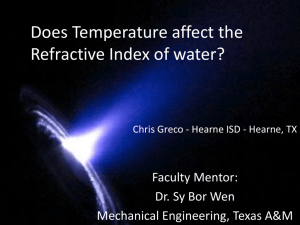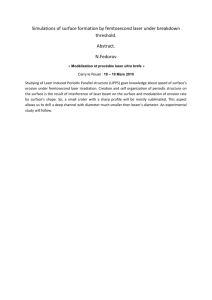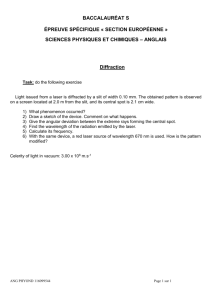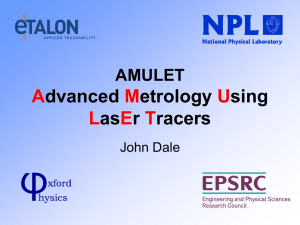Development of laser interferometer prototype used for satellite-to-satellite displacement measurement
advertisement
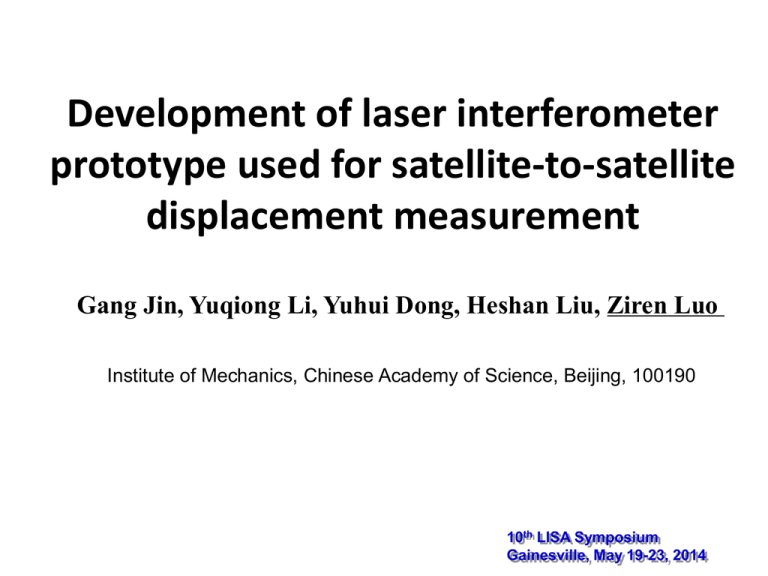
Development of laser interferometer prototype used for satellite-to-satellite displacement measurement Gang Jin, Yuqiong Li, Yuhui Dong, Heshan Liu, Ziren Luo Institute of Mechanics, Chinese Academy of Science, Beijing, 100190 10th LISA Symposium Gainesville, May 19-23, 2014 Contents • Motivation • Introduction to SLI Constitution Key technologies • SLI development in IMECH Phase-meter Prototype of SLI Beam pointing control Phase locking • Summary & outlooks Motivation----detect G.W. in space Gravitational Wave (G.W.) direct prediction of general relativity Low frequency G.W. sources (0.1mHz-1Hz): • • • • • Go to space to avoid seismic noise 1~10 pm Pioneer mission LISA (eLISA) LISA type missions • BBO • DECIGO • ALIA • Chinese proposal (10mHz-1Hz) Binary of super mass black holes Extreme mass ratio in-spirals Intermediate mass ratio in-spirals Binary of compact objects …… Detecting G.W. in space ----A bite of China 2008 IMRIs and binary of B.H.s formed by Pop III stars[1] 2011 Technology demonstration mission proposed, building prototypes Official Chinese space G.W. detection working group constituted 2012 Institutes of CAS, Universities, satellite companies LISA X symposium 2014 Recent progress in China Independent proposal collaboration of space laser interferometer G.W. detection between CAS and ESA IMECH assigned to build SLI [1] Gong, Xuefei, et al. "A scientific case study of an advanced LISA mission."Classical and Quantum Gravity 28.9 (2011): 094012. Introduction to SLI ----constitution Heterodyne detection & non-Gaussian profile weak light phase lock 20MHz, 10pw, top-hat beam profile, locking precision10−5 𝑟𝑎𝑑/√𝐻𝑧 S.C.2 S.C.1 Million Kilometers Introduction to SLI ----constitution Hardware: • Laser, pre-stabilized to 30𝐻𝑧/√𝐻𝑧; • Interferometer, 1𝑝𝑚/√𝐻𝑧, 1𝑛𝑟𝑎𝑑/√𝐻𝑧; • Telescope, 1𝑝𝑚/√𝐻𝑧, 1𝑛𝑟𝑎𝑑/√𝐻𝑧; • Phase meter, 10−5 𝑟𝑎𝑑/√𝐻𝑧; • Pointing ahead angle mechanism. Introduction to SLI ----key technologies Shot noise Laser frequency noise Clock jitter noise Pointing jitter noise Data pre-processing and etc. Big telescope, high laser power [1] Pre-stabilization, arm-locking, TDI [2] Sideband-sideband scheme [3] Pointing control techniques [1] Clock sync., ranging & laser comm. [1, 4] [1] Danzmann K, Bender P, Brillet A, et al. LISA pre-phase A report[J]. Max-Planck-Institut fur Quantenoptik, Report MPQ, 1998, 208. [2] Sheard B S, Gray M B, McClelland D E, et al. Laser frequency stabilization by locking to a LISA arm[J]. Physics letters A, 2003, 320(1): 9-21. Tinto M, Estabrook F B, Armstrong J W. Time-delay interferometry for LISA[J]. Physical Review D, 2002, 65(8): 082003. [3] Shaddock D A. Space-based gravitational wave detection with LISA[J]. Classical and Quantum Gravity, 2008, 25(11): 114012. [4] Esteban J J, García A F, Barke S, et al. Experimental demonstration of weak-light laser ranging and data communication for LISA[J]. Optics express, 2011, 19(17): 15937-15946. Introduction to SLI ----to summarize Methodology • Heterodyne detection • Top-hat beam profile weak light phase lock Hardware • • • • • Stable laser source Ultra stable interferometer Ultra stable telescope High precision phase meter Pointing ahead angle mechanism Key technique • • • • • • • Arm-locking TDI USO noise cancellation scheme Pointing control techniques Clock synchronization Laser ranging Interferometeric laser communication SLI development in IMECH ---- A brief introduction Funded by national space science center 2010 Methodological demonstration: homodyne V.S. heterodyne [1] Funded by Chinese Academy of Science 2012 building hardware, prototype testing, technology development LISA X symposium 2014 Recent status [1] Yu-Qiong L, Zi-Ren L, He-Shan L, et al. Chinese Physics Letters, 2012, 29(7): 079501. SLI development in IMECH ---- the interferometer • Chinese space G.W. detector • technology demonstration mission Chinese counterpart of LISA pathfinder • Interferometer prototype Noisy laser source: worse than 1MHz/√Hz Achieve 100pm/√Hz, thermal noise dominates Polarizing interferometer Rectangular and straightforward Fewer component Equal arm-length SLI development in IMECH ---- the phase meter Based on FPGA DPLL 4 channels Signal frequency 1-2MHz Output frequency >200Hz LISA Symposium X, section Interferometry and Optics, Thursday, May 22nd, 17:15-17:30 SLI development in IMECH ---- the pointing control Differential Wave Sensing [1] Pointing control demonstration [1] Morrison E, Meers B J, Robertson D I, et al. Automatic alignment of optical interferometers[J]. Applied Optics, 1994, 33(22): 5041-5049. LISA Symposium X, Poster Session Tuesday, May 20th, 15:45-17:30 SLI development in IMECH ---- the phase locking Master laser Interferometer Phase difference Phase meter Slave laser Gaussian profile 1mW power Locking precision mrad Interferometer noise dominates Summary & outlooks • Heterodyne detection • Top-hat beam profile weak light phase lock • A • N Hardware • • • • • Stable laser source Ultra stable interferometer Ultra stable telescope High precision phase meter Pointing ahead angle mechanism • • • • • N A N A N Key technologies • • • • • • • Arm-locking TDI USO noise cancellation scheme Pointing control techniques Clock synchronization Laser ranging Interfermeteric laser communication • • • • • • • N N N A N N N Methodology Acknowledgement • With special thanks to Gerhard Heinzel for his endless help in almost everything of interferometer development; • Thanks to Doc. Marina for her help of interferometer building; • Thanks to Doc. Vitali for teaching us using IFOCAD; • Thanks to Doc. Simon for sharing noise hunting experience; • We also own many thanks to Albrecht Ruediger, Aiko Samblowski, Yan Wang and many other AEI members for their valuable helps. Thank you all

